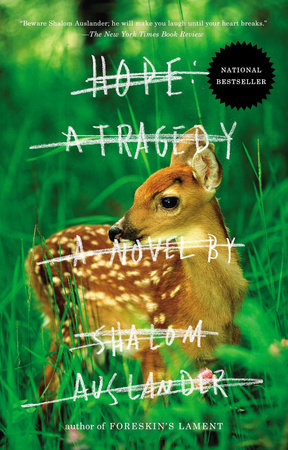Hope: a Tragedy Reader’s Guide
By Shalom Auslander


INTRODUCTION
Solomon Kugel left New York City to raise his family in a safer environment. Unfortunately, the rural enclave of Stockton, New York, is not the peaceful haven that he anticipated. An arsonist is running amok, Kugel can’t cover the mortgage—and a putrid smell is emanating from the farmhouse’s attic.
Instead of finding mouse droppings or a hibernating raccoon, Kugel discovers a withered woman who claims to be Anne Frank.
Kugel is not a practicing Jew. He doesn’t know where to buy matzoh. He’s never even read The Diary of Anne Frank. Yet, Kugel hews to his cultural stereotype in one crucial sense: he is crippled by guilt. Already torn between the needs of his wife, child, and aged mother, Kugel begins catering to his demanding attic dweller as well. Anne Frank adheres to the schedule she learned as a girl—sleeping through the day while writing the follow–up to her thirty–two–million–copy bestselling memoir at night. Downstairs, Kugel lies sleepless, listening to the steady “tap, tap, tap“ of Anne’s fingers on the keys and wondering if this is the night his house will be torched.
Filled with gut–wrenching pathos and brazenly irreverent hilarity, Hope: A Tragedy is wholly un–Kosher as it definitively confirms Shalom Auslander’s arrival as a major literary force.
Shalom Auslander was “raised like veal“ in Monsey, New York. Nominated for the Koret Jewish Book Award for writers under thirty–five, he has published articles in GQ, Tablet, The New York Times Magazine, andThe New Yorker, and has had stories aired on NPR’s This American Life. The author of the short story collection Beware of God and the memoir Foreskin’s Lament, he lives in New York.
Just for joining you’ll get personalized recommendations on your dashboard daily and features only for members.
Find Out More Join Now Sign In